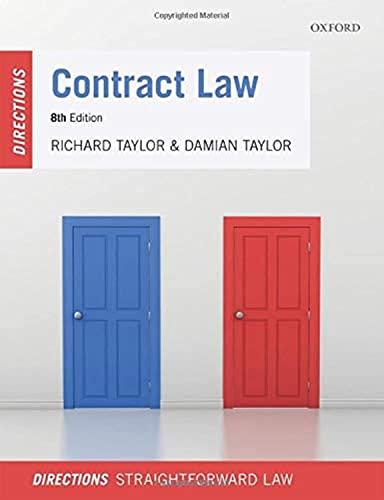Question
Lucy v. Zehmer Supreme Court of Appeals of Virginia,196Va.493,84S.E.2d516.1954. Background and Facts W. O. Lucy and A. H. Zehmer had known each other for fifteen
Lucy v. Zehmer
Supreme Court of Appeals of Virginia,196Va.493,84S.E.2d516.1954.Background and Facts
W. O. Lucy and A. H. Zehmer had known each other for fifteen to twenty years. For some time, Lucy had been wanting to buy Zehmer's farm. Zehmer had always told Lucy that he was not interested in selling. One night, Lucy stopped in to visit with the Zehmers at a restaurant they operated. Lucy said to Zehmer, "I bet you wouldn't take $50,000 for that place." Zehmer replied, "Yes, I would, too; you wouldn't give fifty." Throughout the evening, the conversation returned to the sale of the farm. At the same time, the parties were drinking whiskey. Eventually, Zehmer wrote up an agreement, on the back of a restaurant check, for the sale of the farm, and he asked his wife, Ida, to sign itwhich she did. When Lucy brought an action in a Virginia state court to enforce the agreement, Zehmer argued that he had been "high as a Georgia pine" at the time and that the offer had been made in jest: "two doggoned drunks bluffing to see who could talk the biggest and say the most:" Lucy claimed that he had not been intoxicated and did not think Zehmer had been, either, given the way Zehmer handled the transaction. The trial court ruled in favor of the Zehmers, and Lucy appealed.
In the Words of the Court ...Buchanan, J. [Justice] Delivered the Opinion of the Court
* * * *
In his testimony, Zehmer claimed that he "was high as a Georgia pine," and that the transaction "was just a bunch of two doggoned drunks bluffing to see who could talk the biggest and say the most:" That claim is inconsistent with his attempt to testify in great detail as to what was said and what was done.
* * * *
The appearance of the contract, the fact that it was under discussion for forty minutes or more before it was signed; Lucy's objection to the first draft because it was written in the singular, and he wanted Mrs. Zehmer to sign it also; the rewriting to meet that objection and the signing by Mrs. Zehmer; the discussion of what was to be included in the sale, the provision for the examination of the title, the completeness of the instrument that was executed, the taking possession of it by Lucy with no request or suggestion by either of the defendants that he give it back, are facts which furnish persuasive evidence that the execution of the contract was a serious business transaction rather than a casual, jesting matter as defendants now contend.
* * * *
In the field of contracts, as generally elsewhere,we must look to the outward expression of a person as manifesting his intention rather than to his secret and unexpressed intention. The law imputes to a person an intention corresponding to the reasonable meaning of his words and acts. [Emphasis added.]
* * * *
Whether the writing signed by the defendants and now sought to be enforced by the complainants was the result of a serious offer by Lucy and a serious acceptance by the defendants, or was a serious offer by Lucy and an acceptance in secret jest by the defendants, in either event it constituted a binding contract of sale between the parties.
Decision and Remedy
The Supreme Court of Virginia determined that the writing was an enforceable contract and reversed the ruling of the lower court. The Zehmers were required by court order to follow through with the sale of the Ferguson Farm to the Lucys.
What If the Facts were Different?
Suppose that the day after Lucy signed the agreement, he decided that he did not want the farm after all, and Zehmer sued Lucy to perform the contract. Would this change in the facts alter the court's decision that Lucy and Zehmer had created an enforceable contract? Why or why not?
Impact of this Case on Today's Law
This is a classic case in contract law because it so clearly illustrates the objective theory of contracts with respect to determining whether an offer was intended. Today, the objective theory of contracts continues to be applied by the courts, and theLucy v. Zehmerdecision is routinely cited as a significant precedent in this area.
Task #1:Assume u are the lawyer for Lucy, what legal arguments would u present to the judge on behalf of your client Lucy?
Task #2:Assume u are the lawyer forZehmer, what legal arguments would u present to the judge on behalf of ur clientZehmer?
Task #3:Assume u are the judge, respond to one post explaining who wins the case and why.providethe legal reasons for ur decision.
Step by Step Solution
There are 3 Steps involved in it
Step: 1

Get Instant Access to Expert-Tailored Solutions
See step-by-step solutions with expert insights and AI powered tools for academic success
Step: 2

Step: 3

Ace Your Homework with AI
Get the answers you need in no time with our AI-driven, step-by-step assistance
Get Started


